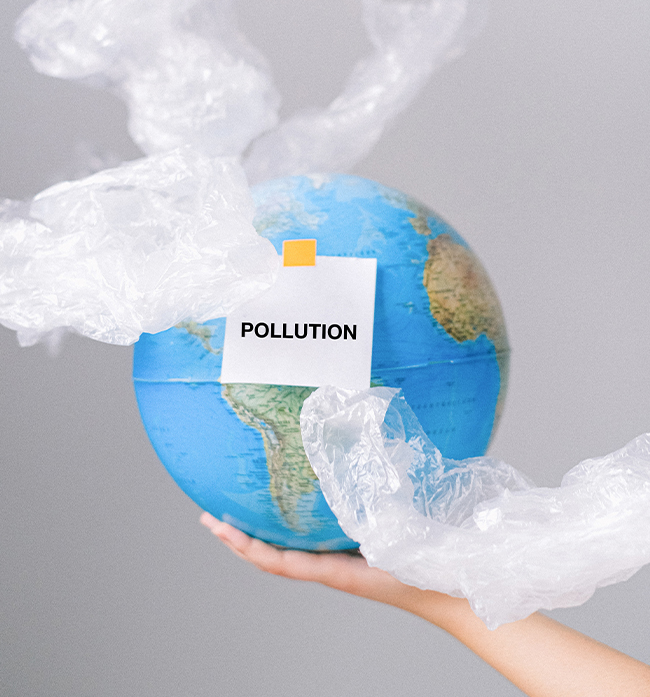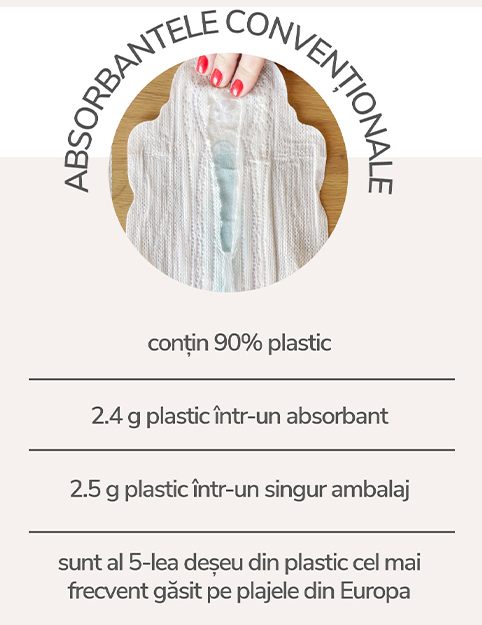
Half of the world's population needs (and uses) menstrual products. More precisely, a person on her period buys about 12,000 disposable products during her lifetime!
But few of us are aware that most menstrual products contain up to 90% plastic, pesticides, chemicals and bleaches. In addition, many of the companies that produce them do not practice transparency, so all these ingredients are hidden and go unnoticed by consumers; which complicates things, obviously.
How do we become aware of these issues and educate ourselves in menstrual care when there is little transparency? And how can you know what your period's impact is on the environment?
Are you polluting nature with your period?
400 kilograms of menstrual waste: that's how much a single menstruating person produces in a lifetime! And conventional pads and absorbents generate around 590,000 tonnes of waste every year, and that's just in the EU!

"There is a huge impact of menstrual waste on the environment. Many of them contain plastics, which are extremely difficult to break down", ( Catherine Bozec, Zero Waste Scotland )
The hidden ingredients in tampons and pads
Most of the time, we don't wonder what ingredients a tampon or absorbent might have. Recent studies have shown that they contain toxic ingredients, easily absorbed into the blood, endocrine disruptors, carcinogens, perfumes and pesticides. Yes, it sounds pretty scary…
And when all those harmful, hidden ingredients and plastics end up in landfills, sewage systems and waterways - the entire ecosystem suffers. Not to mention the health of the consumer.
What's the problem with conventional cotton?
And speaking of harmful materials, did you know that of all crops, conventional cotton is the most chemically treated crop in the entire world?
Current cotton production methods are environmentally unsustainable. There are recent studies and research that prove it: conventional cotton farms use pesticides and have a much higher level of water consumption, according to the World Wildlife Organization. So not only is conventional cotton bad for your health, but it's also bad for the workers who produce it and the environment.
Conventional cotton often has dangerous toxins such as GMOs, pesticides, formaldehyde, aromatic solvent, heavy metals, chlorine and other chemicals. And when you use a conventional cotton menstrual product, all these toxic substances end up in your body.
Although it is used a lot in everyday life (think of the textile industry too), it does not mean that cotton is harmless. And precisely because it is in such high demand, conventional cotton farms use harmful pesticides to make it grow faster!
The good news is that there is an alternative to all of this. And yes, it comes with a host of benefits for both your body and health, as well as the planet!
What is eco menstruation?
The term "eco-menstruation" is used to describe eco-friendly alternatives to menstrual products that are reusable or made from biodegradable materials. This includes menstrual cups, tampons and absorbents made of certified organic cotton, reusable tampons or menstrual panties. All these alternatives are kinder to nature and also to your body and health. So, we are talking about giving up toxic products. 
A simple commercial absorbent pad, containing up to 90% plastic in its composition, would take between 500 and 800 years to decompose, and the toxic ingredients inside the product, coming into contact with your body, can cause hormonal imbalances. The solution? Avoid conventional products and look for non-toxic alternatives!
Non-toxic products
Fortunately, it's not complicated at all. It starts simple, step by step. When you choose, month after month, organic cotton in your menstrual products, you have a positive impact on your health and the environment. And ENROUSH is with you with the products you need, without hidden toxic ingredients. 
Made from 100% GOTS certified organic cotton, they guarantee that the absorbents and tampons you use come from safe, ethical sources, respecting environmental protection standards. Have you tried them yet? Tell us what you like about them!
Why choose organic cotton?
Organic cotton cultivation has a positive impact on the environment: no pesticides are used and agriculture is sustainable, in favor of natural resources such as water. Did you know that organic cotton farming uses less energy and promotes biodiversity? 
The good thing is that in recent years, the menstrual products industry has started to be more sustainable, reflecting the change in social attitudes towards the environment and health. And when it comes to conversations about menstruation, people are becoming more aware that it's a natural process (although we still have a lot of work to do here!). If in the past there weren't so many options to choose from in a wide range of menstrual products, luckily that's no longer the case.






















